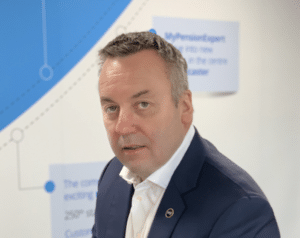It’s not robo-advice, so what is it? asks Andrew Megson, executive chairman, My Pension Expert.
The UK financial services industry has a rich history of product-based solutions designed to assist people with managing their personal finances – particularly when it comes to retirement planning.
Indeed, Nigel Peaple, director of policy and advocacy at the Pension and Lifetime Savings Association, recently told the Work and Pensions Committee (WPC) that a combined product for anyone reaching retirement age could replace needing to provide advice. The combined product would be a mixture of cash, investments and guaranteed income designed to be “fit for purpose”, foregoing the need to seek advice on how to approach your pension.
Understandably, people approach retirement with some trepidation due to a significant change in lifestyle as they look to wind down work and make the financial choices with their pension to maximise their financial wellbeing in retirement.
However, a combined product which does not take into account their individual circumstances is a recipe for disaster. It entails a lack of transparency, understanding of what the product can achieve and impacts of factors such as longevity being a mystery to the majority of the population. We have been here before. There is no substitute for independent advice. The real issue is how does the industry increase access to advice and ensure independent advice is not just for the wealthy?
Whilst efforts to improve access to advice is commendable, the proposed combined product is unlikely to help individuals achieve better retirement outcomes. That is to say, a self-navigation system, often referred to as robo-advice can only provide generic, automated advice that only tries to figure out what individuals want to achieve – usually motivated by short-term goals. This is not only problematic as what most people need is a long-term retirement strategy but is also complicated which potentially leads to poor customer outcomes, the exact opposite of what the regulator is trying to achieve.
Evidently, robo-advice does not offer tailored advice which is specific to individuals’ current financial situation and their financial goals. Only independent financial advice can offer this; although changes must be made in order to ensure that advice is readily available to everyone, not just the wealthy few.
And over the past two years, there have been some notable changes which suggest that independent financial advisers are willing and able to accept the need for such change.
The effects of the pandemic
When the pandemic hit the financial services industry like many others it was made to transition to virtual services.
Research from the end of last year found that nearly a third (31%) of people that had received financial advice had used remoted advice channels for the first time since the UK first entered lockdown in 2020.
Expectedly, like all industries that embraced the tech revolution, the change in working practices has seen huge improvements in services, especially independent financial advice. This is evident in advisers’ approaches to client interactions as social distancing made virtual meetings the norm.
Rather than face-to-face meetings advisers continue to conduct consultations via telephone or video calls – providing a consistent line of connection between them and people seeking financial advice.
Remote practices to advice have created a more efficient and streamlined approach to advice, whilst improving wider national access to advice. For example, an individual based in Cornwall could now speak to an adviser from Yorkshire, without needing to dedicate time or resource to travel for a face-to-face meeting.
Naturally, the client attitudes towards this form of advice have been largely positive. More than half of advised individuals (56%) are now reported to be happier than they were before the first lockdown to receive advice remotely.
However, with distancing rules now becoming a thing of the past the industry must maintain the progress made since the beginning of the outbreak and go a step further to improve the accessibility of financial advice.
Further improvements in platforms and tech
Retirement planning must involve an open-door system that ensures people attain the best advice and information regarding their savings and investment. Further progress in tech-based solutions combined with independent financial advice can enable this.
Moreover, it is important to get savers engaged in their pensions. Indeed, one barrier that advisers face is getting people to attend regular reviews. Understandably, those that are years away from retirement may feel it more hassle that its worth to attend a meeting about their pension pot. As such, a lighter tech-based approach such as an online app could encourage more engagement.
The benefit of such platforms is the simplicity. Advisers can maintain simple communication through email to provide updates to confirm if clients are on track to meet their retirement goal, or provide information on topics of interest such as investment opportunities. Not only does this mean better access to savings, but it ensures a close relationship between client and advisors.
Ultimately, as this hybrid of tech-based solutions and independent financial advice takes hold of the industry it will lower the cost of advice and make it more accessible to the masses. And, certainly, considering more than half (53%) of UK adults are now seeking financial advice, this is a huge benefit.
Undoubtedly, the government is right to try to make pensions more accessible for savers – retirement planning should be open to all. However, product-based solutions will simply not work considering their lack of tailored advice. Only a hybrid model of tech-based solutions that have emerged from the pandemic and independent financial advice can ensure accessibility. Striving to further advance this model will help people to achieve the retirement outcome they deserve.
[Main image: charlesdeluvio-Lks7vei-eAg-unsplash]
































